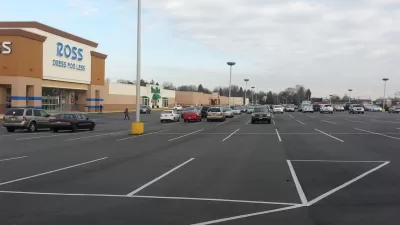Despite mounting evidence that parking requirements subsidize cars, raise the cost of housing, and contribute to greenhouse gas emissions, few policymakers have strongly advocated to end them.

While housing advocates praise Alexandria Ocasio-Cortez's move to call on city council candidates seeking her endorsement to fight to end single-family zoning, Nicole A. Murray calls on progressives like AOC to also address another component of zoning code that has far-reaching effects on housing affordability, density, and transit use: minimum parking requirements.
Originally pushed by the likes of The American Auto Association and Automotive Safety Foundation (which is associated with “automotive and allied industries“) to accommodate the influx cars in the post-war years, the parking requirements enshrined in the zoning law that has guided city policy since 1961 have mandated residential and commercial storage space for thousands of vehicles, regardless of proximity to (current or future) transit, the transportation needs and demographics of residents, or even local air quality or traffic-safety statistics.
Murray provides a list of reasons why mandatory parking requirements undermine affordable housing and public transit use. These include the high cost of building parking spots(which gets added on to the cost of housing units), the massive amount of space required for parking, and the added congestion that free parking encourages. They also raise costs for renters and carless transit users who don't benefit from parking. As Murray puts it, "Robert Moses couldn’t dream up a better deal to keep mass motoring alive." If Progressives want to make cities more livable and equitable, Murray argues, addressing parking regulations is an essential step.
FULL STORY: OPINION: Progressives Should Look To Outlaw Parking Minimums

Alabama: Trump Terminates Settlements for Black Communities Harmed By Raw Sewage
Trump deemed the landmark civil rights agreement “illegal DEI and environmental justice policy.”

Planetizen Federal Action Tracker
A weekly monitor of how Trump’s orders and actions are impacting planners and planning in America.

The 120 Year Old Tiny Home Villages That Sheltered San Francisco’s Earthquake Refugees
More than a century ago, San Francisco mobilized to house thousands of residents displaced by the 1906 earthquake. Could their strategy offer a model for the present?

Ken Jennings Launches Transit Web Series
The Jeopardy champ wants you to ride public transit.

BLM To Rescind Public Lands Rule
The change will downgrade conservation, once again putting federal land at risk for mining and other extractive uses.

Indy Neighborhood Group Builds Temporary Multi-Use Path
Community members, aided in part by funding from the city, repurposed a vehicle lane to create a protected bike and pedestrian path for the summer season.
Urban Design for Planners 1: Software Tools
This six-course series explores essential urban design concepts using open source software and equips planners with the tools they need to participate fully in the urban design process.
Planning for Universal Design
Learn the tools for implementing Universal Design in planning regulations.
Clanton & Associates, Inc.
Jessamine County Fiscal Court
Institute for Housing and Urban Development Studies (IHS)
City of Grandview
Harvard GSD Executive Education
Toledo-Lucas County Plan Commissions
Salt Lake City
NYU Wagner Graduate School of Public Service





























